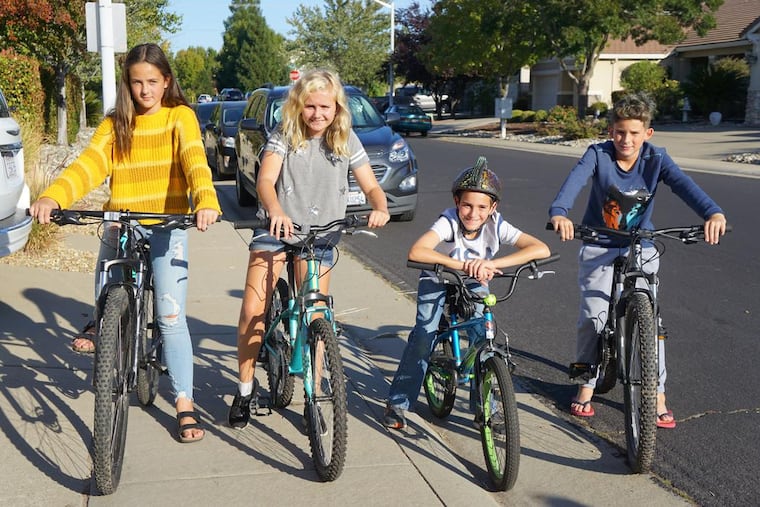These pre-teens stopped what they were doing to help find a woman with dementia
They heard police ask for help in finding a woman who had gone missing, and they did.

As soon as they heard the police helicopter hovering above their Roseville, Calif., neighborhood, Hope Claiborne and Makenna Rogers, both 11, sprang into action.
They heard from the helicopter loudspeaker that police were seeking volunteers to help locate Glenetta Belford, a 97-year-old with dementia who had recently wandered away from her residential care center. They needed to find Belford before nightfall, and it was already about 4 p.m.
Hope and Makenna, who were hanging out after school in a park near their homes, decided to grab their bikes and also Hope’s brother, Kashton Claiborne, and his friend, Logan Hultman, both 10.
The four of them rode up and down the surrounding streets for more than an hour, joining dozens of other community volunteers who were looking for the woman.
Hope’s father, Daniel Claiborne, texted her a photo of Belford so they’d be able to identify the woman.
After breaking briefly for dinner (Logan also had to bandage a few scrapes after taking a spill on his bike), the kids hopped back on their bicycles and did another search in their community, 20 miles from Sacramento. They scanned parking lots and playgrounds, looked behind bushes and even checked at their elementary school.
Then, at 6:30 p.m., just before dusk, Hope saw her: a petite elderly woman with pale gray hair, slowly approaching a street corner in a red button-down shirt and white pants.
“Look! There she is!” Hope recalled telling the others.
“I said, ‘Yes! Guys, that has to be her,’ ” Logan recalled.
If Belford had kept walking, Logan said, she would have soon ended up on one of the busiest streets in Roseville.
“I was so excited to find her. We all went over to her and asked, ‘What are you doing?’ ” Hope said. “She didn’t really understand us and told us to go away.”
While the other kids distracted Belford and kept talking to her, Hope dialed 911 and told the dispatcher that they’d found the lost woman.
“The dispatcher was a little surprised to hear a young voice on the line,” said Rob Baquera, public information officer for the Roseville Police Department.
“Because [Belford] has dementia, there was an urgency to find her before she went off on a trail into the woods or ended up on a street with lots of traffic,” Baquera said, adding that he thought it was the first time she’d wandered away from her care center.
Less than a minute after the dispatcher learned where the children and Belford were, a police cruiser arrived at the scene, and Belford was quickly returned to her care center, Baquera said.
“What could have been a much larger crisis was diverted by these junior detectives who jumped into action,” he said.
Perhaps no one is more proud of the kids' quick thinking than their parents.
“People are amazed by what they did in a time when so many kids are inside on their phones,” said Alyssa Hultman, 33, a single mother to Logan and his brother, Zachary, 13. “Children don’t often play outside anymore."
Hope and Kashton's father said he didn't take them seriously at first when they said they were going to search for Belford on their bikes.
“I sent them a picture of her and thought, ‘OK, have fun,’ ” said Claiborne, 37, a single father. “But they were genuinely determined that they were going to find her. When they ran inside later, yelling that they’d found her, I couldn’t believe it.”
Kashton had a simple answer for why they decided to look for the woman.
“The four of us just decided that we could do it,” Kashton said.
Makenna had a different take:
“We really wanted to find Belford and prove that kids can make just as big a difference as adults,” she said.